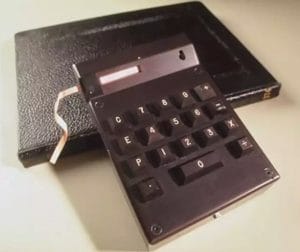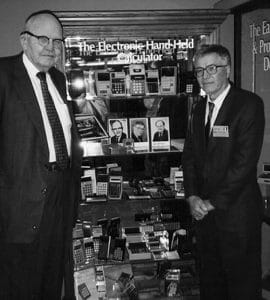As a boy, Merryman was interested in electronics, and by age 11 was working in an appliance store, repairing radios. The store had a copy of Frederick Terman’s book Radio Engineering,, which he referred to for 75 years. (Terman taught engineering at Stanford University, and, with William Shockley, is considered the “father” of Silicon Valley.) His wife, Phyllis, says police officers in the town — Hearne, Texas — would hunt the boy down anytime their police radios had a problem. Day or night. In 1963, Merryman was hired as an engineer by Texas Instruments, even though he was entirely self taught — and didn’t have any college degree. Two years later, the company put Merryman and two other engineers, Jack Kilby and James Van Tassel, into a team, and gave them a project: build a hand-held, battery powered, electronic calculator — or, as the company first called it, a “slide-rule computer.” Using the company’s integrated circuits, which Kilby had invented, Merryman designed the new circuitry in three days. (“And three nights,” he said later.)

It took two years. In 1967, the 4×6″, three-pound machine, called the “CAL-TECH”, didn’t have a digital display: it printed out the calculations on a strip of paper. The prototype is now in the Smithsonian. “Silly me, I thought we were just making a calculator,” Merryman said years later, “but we were creating an electronic revolution.” Indeed the machine had other innovations, including rechargeable batteries and thermal printing. It did addition, subtraction, multiplication and division, but it took another three years to get manufacturing down before it was released for sale — at $400 each, the equivalent to nearly $2,600 in 2019. Merryman retired in 1994, but the next morning TI called and asked if he’d come back as a consultant. He did. “I have a Ph.D. in material science and I’ve known hundreds of scientists, professors, Nobel prize-winners and so on,” says fellow TI alum Vernon Porter. “Jerry Merryman was the most brilliant man that I’ve ever met. Period.” Merryman died February 27, from heart and kidney failure. He was 86.

